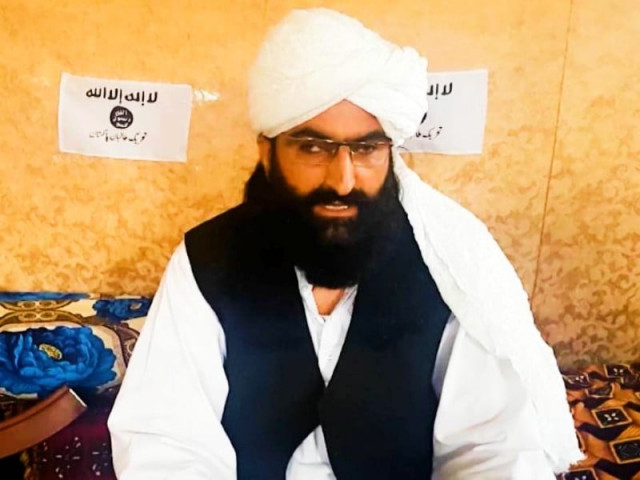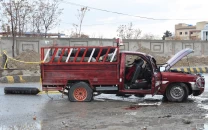TTP leader’s interview with CNN triggers strong backlash
CNN’s interview of Noor Wali Mehsud an attempt to legitimise terrorist organisation, say analysts

An interview of a leader of a designated terrorist organisation with an American news channel has generated lots of heat, with questions being asked about the timing of its airing and whether it was aimed at stirring instability in Pakistan, as the US forces withdraw from Afghanistan.
Analysts termed the CNN’s interview of Noor Wali Mehsud an attempt to legitimise the terrorist organisation and place it parallel to the Afghan Taliban, despite the fact that the TTP was a US-designated terrorist organisation, already neutralised by Pakistan, while the US and other countries are holding negotiations with the Afghan Taliban.
The TTP which had targeted innocent Pakistanis including women and children through several heinous attacks against civilians and armed forces seemed to be changing its stance to protect its illicit activities under the cover of "Islamisation".
Read more: Taliban told to make clean break from ETIM, TTP
Command Eleven – an Open Source Intelligence, think tank, specialising in counter-terrorism, insurgency and extremism – pointed that the TTP is a defunct terror group that was fighting to regroup under the ISPP banner, as their strength and relevance in Afghanistan have been decimated.
Calling the @CNN interview with #NoorWaliMehsud a #propaganda piece would give it too much credit.
— CommandEleven® 🇵🇰 (@commandeleven) July 26, 2021
The #TTP is a defunct #terror group that is fighting to regroup under the #ISPP banner, as their strength & relevance in #Afghanistan has been decimated.https://t.co/ZOGchgKK3L
The TTP interview also revived the memories of the gruesome attack on the Army Public School in Peshawar in which 150 people including 134 school children were massacred.
“Does CNN give airtime to all UN-designated global terrorists or made an exception in the case of Afghanistan-based most wanted terrorist leader of TTP responsible for deadly attacks against Pakistan including the massacre of our children?” questioned Sana Jamal an Islamabad based journalist.
Does CNN give airtime to all UN-designated global terrorists or made an exception in the case of Afghanistan-based most wanted terrorist leader of TTP responsible for deadly attacks against Pakistan including the massacre of our children? https://t.co/jGs0P7PTDx
— Sana Jamal (@Sana_Jamal) July 26, 2021
The people on Twitter described the TTP as a terrorist organisation and said any efforts by the media to resuscitate it by portraying it as a legitimate, reformed, and human-rights-focused organisation would have devastating consequences for the region.
Also read: Pakistan hopes ‘Taliban won’t allow TTP to operate in Afghanistan’
The 27th report of the UN Analytical and Monitoring Team pointed that the TTP has gained strength after a number of militant groups united under its umbrella, which has “resulted in a sharp increase in attacks in the region”, including “more than 100 cross-border attacks [into Pakistan]”.
CTD KPK arrests two militants of TTP from Mardan region
— Pakistan Defence 🇵🇰 (@defence_pk) July 28, 2021
- Arms & Ammunition recovered from possession of the militants. Both were wanted for numerous cases of terror attacks & killings pic.twitter.com/DOglNarmdM
The TTP surfaced in 2007 as an organisation for a number of local militias along Pakistan’s northwestern belt bordering Afghanistan and demanded the imposition of a strict form of Islamic law across the country.
The group carried out dozens of large-scale suicide attacks, bombings and other attacks targeting Pakistani civilians and security forces, till 2014, when the Pakistani military launched a massive operation against its headquarters in North Waziristan. Many were killed and the remaining escaped across the border into eastern Afghanistan.
Indian author - Avinash Paliwal writes in his book that Indian consulates in Afghanistan bordering Pakistan were actively involved in supporting Baloch militant groups and TTP.
— Umar (@umaraqti) July 28, 2021
India's RAW was funneling funds to TTP through Dubai. https://t.co/BxSBE0RR42 pic.twitter.com/K8ZCSBP1a9
After being dislodged, TTP’s ringleaders took refuge in Afghanistan and carried out attacks on Pakistan, including the one on APS Peshawar.
However in recent months, since the TTP’s reunification, a spike has been witnessed in targeted attacks against security forces and tribal elders in North Waziristan.
The Counter-Terrorism Department has successfully foiled several attacks and arrested a number of militants. Interrogation of several TTP members revealed that they were being funded by Indian and Afghan intelligence agencies.
This fact was also reported by an Indian author – Avinash Paliwal who in his book admitted that the Indian consulates in Afghanistan, along the border with Pakistan, were actively supporting Baloch insurgent groups, and the TTP through funnelling of funds by India’s intelligence agency RAW to the TTP.
According to a UN report, over 6,000 terrorists belonging to TTP & Islamic State Khorasan Province (ISKP) including globally designated terrorist commanders Noor Wali and Khorassani are enjoying safe havens in Afghanistan.
The TTP, meanwhile, is trying to legitimate itself by aligning its narrative with the Pashtun Tahafuz Movement (PTM) as its demands now focus on the rights of Pashtuns and Baloch, in a bid to cover up its terrorist acts. Unfortunately, several innocent Pashtuns have fallen victim to their brutality in the areas it once operated.
The alignment of the TTP and the PTM comes as both join hands against the writ of the state in the erstwhile FATA and were adopting anti-state and anti-army narratives of libellous activists to gain their sympathies.
Lt Gen (retd) Shafaat Shah, former Corps Commander Lahore and Ambassador of Pakistan to Jordan said that the TTP is a banned organisation by the US and here its terrorist leader was giving an interview on CNN?
“Shows contacts, sponsorships by Afghan Intelligence, RAW & CIA, otherwise CNN team would not have got access to him?”
TTP is a supposed banned organisation by US & here its terrorist leader is giving interview on CNN ? Shows contacts,sponsorships by Afghan Intelligence,RAW & CIA, otherwise CNN team would not have got access to him?Our in slumber FO should lodge a protest with US(though unlikely) https://t.co/krdAK87Lu5
— SHAFAAT SHAH (@INFANTRY28) July 26, 2021



















COMMENTS
Comments are moderated and generally will be posted if they are on-topic and not abusive.
For more information, please see our Comments FAQ